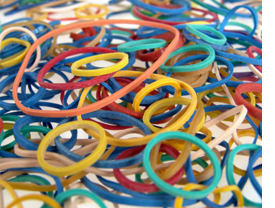Ready... Set... Fail?
/These days, when people talk about innovation, it’s almost inevitable that the word “failure” isn’t far behind. From what I’ve seen, failure and its role as a necessary ingredient for innovation is getting quite a bit of buzz these days, with everyone from design thinkers to social change agents to Warren Buffet saying that failure should be an expected – and even welcomed – outcome when you’re out to create change.
From what I’ve seen, failure and its role as a necessary ingredient for innovation is getting quite a bit of buzz these days, with everyone from design thinkers to social change agents to Warren Buffet saying that failure should be an expected – and even welcomed – outcome when you’re out to create change.
And sure, this isn’t super surprising. Anytime you think and act outside of the proverbial box, you’re bound to make some mistakes, right? Naturally.
But should we really be using the term "failure" to describe this behavior? I’m not so sure. Before I get to that, though, I’ve got a couple of admissions to share:
Admission #1: I am a perfectionist.
I don’t mean perfectionist in a purely competitive way, but more like I really want to get things right. Dotting every I and crossing every T is definitely part of it. But have you ever stopped to think first about which pen might draw the best I or T? I definitely do.
Admission #2: I’m also a planner.
I like knowing what’s coming down the pipeline, what’s on my to-do list, and what I can expect. More than anything, I LOVE when good planning leads to good results (guess it’s a vicious cycle of planning and perfection!).
But here's the problem:
First of all, perfection is often exhausting. Setting the bar beyond what’s doable can sometimes lead to greatness, but it can just as easily lead to burnout. And planning? As they say, expect the unexpected. I may always want to plan, but life gets chaotic, things get in the way, and new opportunities (and roadblocks) pop up.
When I first started my new job, I often used the word “stretched” to describe how I felt. Not in an overwhelmed kind of way, but instead like a rubber band being pulled in two directions at once. In essence, my new job and my new team stretch me everyday to think, act and approach my work in wholly different ways. While I like to plan my next move before getting started, for instance, my team likes to seize a good idea and run with it. And while I like to make sure we have things right (ok, let’s be honest – perfect) before diving into anything, my team is more than comfortable making a few mistakes along the way.
And so here comes Admission #3: mistakes make me very, very uncomfortable.
What's funny is that when we talk about innovation, especially in the social sector, I'll be the first to raise my hand and recognize how important failure is as a part of the learning process. Objectively I can understand that innovation is messy and chaotic, and because of that, it can and should entail making mistakes along the way.
The hardest part, of course, is taking a leap of faith in my own innovation process, knowing full well that I might not get it right the first time.
For a perfectionist who likes to plan, making a mistake is one of the toughest things you could ask me to do! But like a rubber band being stretched, I’m learning to accept the fact that a few mistakes along the way are helpful, and maybe even healthy.
It can be tough to find a balance between waiting to do something until it’s perfect and jumping in with both feet, regardless of the warning bells. I've learned that the need for perfection shouldn’t paralyze you, but your willingness to make mistakes also shouldn’t cloud your better judgment.
How do you move forward thoughtfully and also proactively? How do you try to get it right the first time, but also give yourself permission to make a few missteps along the way?
To be honest, I don’t yet know. But I’m working on it, and I'll let you know how it goes.
Which brings me back to my original question: is failure the same thing as making mistakes? I may be a recovering perfectionist, but I'd argue there's a definite difference!

